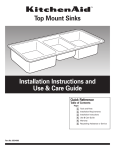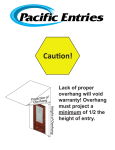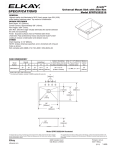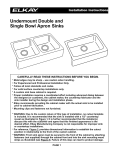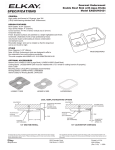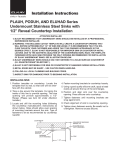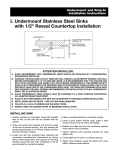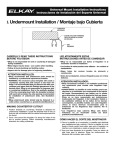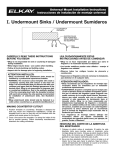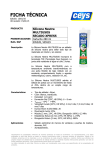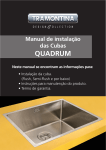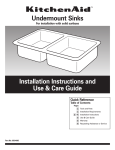Download Elkay ECTRUF32179R Installation Guide
Transcript
Installation Instructions Undermount Apron Front Sinks ATTENTION INSTALLER: CAREFULLY READ THESE INSTRUCTIONS BEFORE YOU BEGIN 1) RECOMMEND THAT UNDERMOUNT SINKS SHOULD BE INSTALLED BY A PROFESSIONAL EXPERIENCED INSTALLER. 2) WARNING: DUE TO THE CUSTOM NATURE OF THIS TYPE OF INSTALLATION, NO CUTOUT TEMPLATE IS INCLUDED. RECOMMEND PROVIDING THE CABINET MAKER WITH THE ACTUAL SINK TO BE INSTALLED PRIOR TO CABINET FABRICATION. IT IS RECOMMENDED THAT THE SINK IS INSTALLED WITH A 1/8” OVERHANG AS ILLUSTRATED IN FIGURE 1. IT IS FURTHER RECOMMEDED THAT THE INSTALLER(S) DISCUSS THIS WITH THE CUSTOMER AND AGREE THAT THIS FINISHED APPEARANCE IS THE DESIRED EFFECT. NOT RESPONSIBLE FOR IMPROPER SINK OR COUNTERTOP INSTALLATIONS. 3) FOR REFERENCE, FIGURE 2 PROVIDES DIMENSIONAL INFORMATION TO ESTABLISH THE CUTOUT POSITION IN RELATIONSHIP TO THE FRONT OF THE CABINET. 4) WARNING: FRONT SINK APRON MUST BE SECURED TO THE FRONT OF THE CABINET BY DRIVING FASTENERS (NOT SUPPLIED) THROUGH THE CABINET FRONT AND INTO THE SINK MOUNTING WOOD STRIPS AS ILLUSTRATED (SEE FIGURE 3). FAILURE OF THIS STEP CAN LEAD TO PRODUCT DAMAGE. 5) PROPER INSTALLATION REQUIRES A COORDINATED EFFORT INCLUDING ADVANCED DIALOG BETWEEN THE DESIGNER (OR CUSTOMER), THE CABINET MAKER, THE COUNTERTOP FABRICATOR AND THE SINK INSTALLER DURING THE DESIGN AND INSTALLATION PHASE. 6) UNDERMOUNT SINKS SHOULD ONLY BE FASTENED TO A SOLID SURFACE COUNTERTOP ® ® (I.E. GRANITE/CORIAN /SILESTONE ). 7) NOT RESPONSIBLE FOR SINK OR COUNTERTOP IF DAMAGED DURING INSTALLATION. 8) METAL EDGES MAY BE SHARP - USE CAUTION WHEN HANDLING. 9) FOLLOW ALL LOCAL PLUMBING AND BUILDING CODES. 10) INSPECT SINK FOR DAMAGE PRIOR TO BEGINNING INSTALLATION. Installation Instructions INSTALLATION PROFILE COUNTERTOP SILICONE CAULK (NOT FURNISHED) MOUNTING CLIP LKUCLIP8 (NOT FURNISHED) SINK FASTENER (NOT FURNISHED) COUNTERTOP OVERHANG APPROX. 1/8” 1/8” COUNTERTOP OVERHANG FIGURE 1 SINK PROFILE (EFRAUF32179R SHOWN) 1/2" RADIUS FOR 1/8” OVERHANG OPENING IN COUNTERTOP COUNTERTOP 17-7/8” FROM CABINET FRONT FOR 1/8” OVERHANG COUNTERTOP OVERHANG 1/8" CABINET BASE 29-3/4” FOR 1/8” OVERHANG FIGURE 2 17-7/8” FROM CABINET FRONT FOR 1/8” OVERHANG COUNTERTOP MOUNTING CLIP LKUCLIP8 (NOT FURNISHED) MINIMAL GAP FASTENER (NOT FURNISHED) MOUNTING WOOD STRIP ON SIDES AND BOTTOM OF FRONT PANEL FRONT PANEL TO MOUNT FLUSH TO CABINET MINIMAL GAP FRONT OF CABINET SINK PROFILE FASTENERS (NOT FURNISHED) THROUGH CABINET TO SECURE TO WOOD STRIP IN FRONT PANEL OF SINK. RECOMMENDED (3) ACROSS FRONT AND (1) ON EACH SIDE. FIGURE 3 CABINET USE AND CARE GUIDE STAINLESS STEEL SINK Easy Cleaning Instructions Rinsing is the most important part of sink care. A stainless steel sink finish will retain its original bright appearance if the sink is rinsed thoroughly after each use. Running the water from the spray hose for a few minutes can do “Thorough” rinsing. Typically, a rinse and towel drying after each use takes care of most everyday clean ups. Ideally, once a week the sink should be scoured with a mildly abrasive cleaner, such as Comet. Rubbing back and forth in the direction of the polish or grain lines will not only remove stubborn stains and greasy film buildups, but will blend usage scratches into the satin finish of the sink. After scouring, rinse thoroughly and wipe dry. Your sink will shine like new! Scratching Like most metals, your new stainless steel sink will scratch. The feature benefit of the unique satin finish is the ease with which these scratches blend into the uniform finish of the sink. This is accomplished with a periodic scouring with a mildly abrasive kitchen cleanser, such as Comet. Rubber Mats The resiliency of stainless steel makes it unnecessary to use rubber mats to protect you sink, dishes and glassware. However, if you do use mats, please remove them after each use. If left in the sink, the water trapped underneath could cause discoloration. Discoloration, Rust and Possible Pitting Wet sponges, clothes, cleaning pads and rubber mats left on the sink can lead to discoloration. Steel wool pads should never be used to clean your sink. Steel Wool will leave small iron particles in the grain lines that will rust and damage the sink. Continued usage in this manner may eventually lead to the sink itself rusting and pitting. Liquid Soap Do not allow concentrated liquid detergent to dry on your sink. Most brands contain chemical additives that will affect the original high luster finish. Chlorides Today, chlorides are found in most all soaps, detergents, bleaches and cleansers. Chlorides are not friendly to the stainless steel surface. They should not come in contact with the surface of the sink for extended periods. When these chemicals are used in your sink, it should be thoroughly rinsed. This is especially noticed when clothes are soaked in a diluted bleach mixture. The mixture can attack the sink at the water line and cause rusting and pitting. Knives Your sink is designed to serve as many things but not as a cutting board or chopping block. This type of use will lead to deep scratches in the sink finish and will dull your knives. Spotting The quality of your water can affect your sink’s appearance. In areas with hard water, a brown surface stain can form on the sink giving the appearance of rust. This phenomena also occurs in water with high iron content. Additionally, in areas with a high concentration of minerals, or with over-softened water, a white film may develop on the sink. To combat this problem, we suggest that the sink be towel dried after use. Foods Heavy salt concentration or foods containing high levels of salt should not be allowed to dry onto the sink surface. Rinse your sink thoroughly after use. Printed in China (Rev C 5/13) 0000000196





